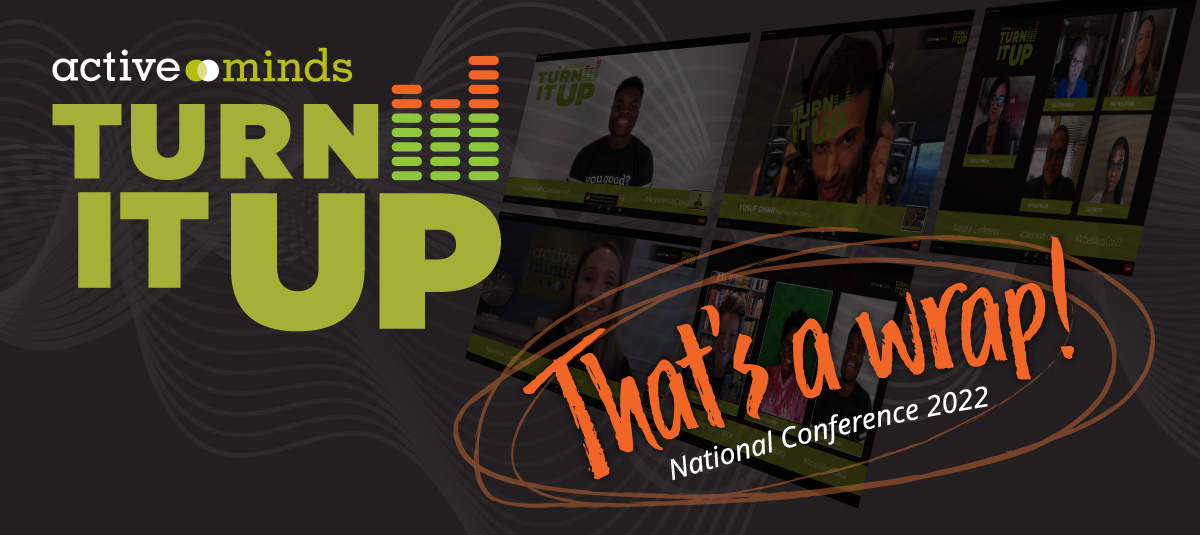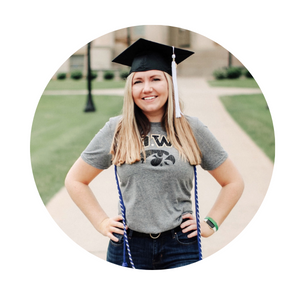Last week, the Active Minds community gathered at our 2022 National Conference to “turn up” the conversation around mental health and discuss the future of mental health in schools, on campuses, and in our communities! More than 1,000 students, chapter advisors, advocates, and professionals registered to learn how we can amplify conversations about mental health through a series of discussions led by some of the field’s leading experts. As an Active Minds intern and first-time Conference attendee, I knew because of the planning that went into the event that it would be unlike any program I had previously attended. I can now say it exceeded my expectations and left me eager to continue discussions in my own life about mental health.
The keynote address was given by Yusuf Omar, co-founder of Hashtag Our Stories, award-winning journalist, and renowned speaker. Yusuf gave one of the most engaging (and unique) presentations I’ve ever seen, complete with engaging filters and graphics seamlessly incorporated into his speech. He focused on the importance of effective storytelling and emphasized the need to share your own mental health journey, advocate for resources in underserved communities, and engage with others about their mental health experiences, which may be different from your own.
Following the keynote, attendees listened in and joined the discussion via chat on three crucial topics in mental health today: data and research, microaggressions, and using technology to build connections.
“Using Data to Improve Mental Health” featured a panel discussion with four of the field’s leaders in research who discussed the impact data collection and utilization can have on the way we talk about and shape best practices for mental health awareness and treatment. During the discussion, Seli Fakorzi, Director of Mental Health Operations for TimelyMD, shared that “…data helps us not only to take a picture or snapshot of the student population that we serve, but it also helps colleges and universities plan in the case of worst-case scenarios.” What I took away from this quote, and the larger discussion, is that data can be helpful in terms not only of the collection of demographic information but also in allowing organizations to know what resources students need before a crisis occurs. Therefore, in the coming years, it will be important to focus on effective methods of equitable data collection, like through the All of Us Research Program.
“Words Matter: Responding to Mental Health Microaggressions” was led by Active Minds’ own Dr. Tanya Bass and Lauren Cikara and emphasized the impact that expressions and words can have on mental health. Being aware of phrases that make communication hostile and making an effort to avoid using them can help in making our communities a healthier and safer place, especially for BIPOC individuals. During the presentation, in response to a question about how to repair a relationship after a microaggression has caused harm, Dr. Bass shared, “As we all are going through this process of changing culture and changing language, we’re all probably going to mess up. The key is that in order for us to make that change, we can’t give up. So mess up, but don’t give up.” A commitment to learning and growing is necessary for any conversation related to mental health language, as new information is always being shared and best practices continue to evolve.
Continuing on the discussion of relationships, Obi Felten, founder of Flourish Labs, then shared during her flash talk about the importance of technology in improving mental health and building connections. She discussed a new tool by Flourish Labs called myala, a self-tracking app for the mind that helps you understand the ups and downs of your mind and connects you to peer supporters. The app is currently focused on students’ mental health, and Obi shared her reasoning behind that with the audience, saying, “Our mission is flourishing minds for all, and we’re starting with students. I don’t have to tell you why – the need is huge. And if we can help someone early in their life to flourish, then it impacts them during their entire life.” If you’re interested in learning more about this app, click here.
Conference concluded with four breakout sessions that allowed attendees to choose a presentation that interested them and allowed them to learn from experts about a wide range of topics relating to mental health. These sessions included “Mental Health Advocacy in the Transition from High School to College,” “Navigating Tough Conversation using V-A-R®,” “Nothing About Us Without Us: Advocating for Mental Health Policy Change,” and “Designing Racial Equity in High Education Mental Health.” My personal favorite was “Nothing About Us Without Us: Advocating for Mental Health Policy Change” because the discussion was especially empowering to me as a young adult. The presenters encouraged us to take action and stand up for the change we’d like to see, whether it be in the world or on campus.
Throughout the Conference, I continued to learn more about the importance of amplifying mental health conversations, whether it be through data collection and utilization, discussions around mental health-related language, or even reflections about my own mental well-being. If you attended the Conference and would like to revisit any content, please visit the Conference portal. For those who were unable to attend but would like access to session recordings and additional resources, you can purchase access here.




